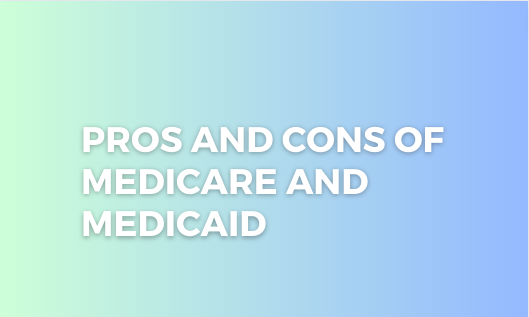Medicare and Medicaid are two government programs that provide healthcare coverage for different segments of the population in the United States. Medicare is primarily for individuals aged 65 and older, while Medicaid offers coverage to low-income individuals and families. In the following list, we present pros and cons of Medicare and Medicaid, highlighting their benefits and potential drawbacks.
Pros:
- Universal Coverage: Medicare provides health insurance for eligible individuals, ensuring access to healthcare for millions of Americans.
- Comprehensive Coverage: Medicare covers a wide range of medical services, including hospital stays, doctor visits, preventive care, and prescription drugs.
- Affordability: Medicare offers a more affordable option for healthcare coverage compared to private insurance plans for many beneficiaries.
- Financial Protection: Medicare helps protect individuals from high medical expenses and provides a safety net against catastrophic healthcare costs.
- Guaranteed Benefits: Medicare ensures that beneficiaries receive specified benefits, reducing uncertainty and allowing for better financial planning.
- Preventive Care: Medicare covers preventive services like screenings, vaccinations, and wellness visits, promoting early detection and disease prevention.
- Stability: Medicare provides a stable source of coverage for older adults and people with disabilities, eliminating the risk of losing insurance due to changes in employment or health status.
- Nationwide Accessibility: Medicare is available throughout the country, ensuring access to healthcare services regardless of location.
- Choice of Providers: Beneficiaries can choose from a broad network of healthcare providers who accept Medicare, giving them more options for care.
- Simplicity: Medicare simplifies the healthcare system for beneficiaries by consolidating coverage under a single program.
- Long-Term Care Coverage: Medicare covers limited long-term care services, such as skilled nursing facility care and home health services.
- Prescription Drug Coverage: Medicare Part D provides coverage for prescription drugs, reducing out-of-pocket expenses for medications.
- Continuity of Care: Medicare allows individuals to maintain their relationship with healthcare providers when transitioning from private insurance to Medicare.
- Primary Care Emphasis: Medicare emphasizes primary care and preventive services, promoting a focus on overall health and wellness.
- Support for Rural Areas: Medicare helps ensure healthcare access in rural areas where providers may be scarce by offering reimbursements that incentivize care.
- Medicare Advantage Options: Beneficiaries have the choice to enroll in Medicare Advantage plans, which often offer additional benefits and integrated care coordination.
- Coverage for Chronic Conditions: Medicare covers the treatment and management of chronic conditions, providing ongoing support for those with complex health needs.
- Economic Stimulus: Medicare contributes to the economy by supporting healthcare jobs and providing financial stability to healthcare providers.
- Lower Administrative Costs: Medicare has lower administrative costs compared to private insurance plans, reducing overall healthcare expenditures.
- Positive Outcomes: Studies have shown that Medicare has contributed to improved health outcomes and increased life expectancy among beneficiaries.
Cons:
- Limited Coverage: Medicare does not cover certain services like dental care, vision care, and hearing aids, leaving beneficiaries to pay for these out-of-pocket or seek additional coverage.
- Cost-Sharing Obligations: Beneficiaries are responsible for various cost-sharing obligations, such as deductibles, copayments, and coinsurance, which can still result in significant out-of-pocket expenses.
- Income-Related Premiums: Higher-income beneficiaries are subject to income-related premiums, leading to higher costs for some individuals.
- Coverage Gaps: There may be gaps in coverage, such as the “donut hole” in Medicare Part D prescription drug coverage, where beneficiaries may face higher drug costs.
- Limited Provider Networks: Some Medicare plans have restricted provider networks, which can limit choice and access to preferred healthcare providers.
- Waiting Periods: Medicare coverage for certain services, such as skilled nursing facility care, may require a waiting period or meet specific eligibility criteria.
- Complex Enrollment Process: The enrollment process for Medicare can be confusing and time-consuming for individuals not familiar with the program.
- Lack of Care Coordination: Fragmented care and lack of care coordination can be a challenge under traditional fee-for-service Medicare.
- Potential for Fraud and Abuse: Medicare is susceptible to fraud and abuse, which can lead to unnecessary costs and compromised patient care.
- Provider Reimbursement Challenges: Low reimbursement rates from Medicare can make it challenging for some healthcare providers to sustain their practices.
- Geographical Variations: Medicare reimbursement rates and coverage may vary by region, leading to disparities in access to care and provider availability.
- Inadequate Long-Term Care Coverage: Medicare’s coverage for long-term care services is limited, often requiring individuals to seek additional insurance or pay out-of-pocket.
- Limited Access to Specialists: Some specialists may not accept Medicare due to lower reimbursement rates, limiting access for beneficiaries.
- Administrative Burden for Providers: Healthcare providers must navigate complex Medicare billing and documentation requirements, adding administrative burden.
- Overutilization Concerns: Medicare may incentivize overutilization of services due to fee-for-service payment models, leading to unnecessary tests or treatments.
- Lack of Dental and Vision Coverage: The lack of coverage for routine dental and vision care can result in unmet healthcare needs for Medicare beneficiaries.
- Technology Adoption Challenges: Medicare may lag in adopting new technologies and treatments, potentially limiting access to innovative care options.
- Delayed Coverage for Pre-existing Conditions: Medicare imposes waiting periods for coverage of pre-existing conditions for individuals who did not have prior creditable coverage.
- Potential for Future Funding Challenges: As the population ages, there may be concerns about the long-term financial sustainability of the Medicare program.
- Limited Flexibility: Medicare has strict rules and regulations that may restrict certain healthcare options or alternative care arrangements for beneficiaries.
Pros
- Universal Coverage
- Comprehensive Coverage
- Affordability
- Financial Protection
- Guaranteed Benefits
- Preventive Care
- Stability
- Nationwide Accessibility
- Choice of Providers
- Simplicity
- Long-Term Care Coverage
- Prescription Drug Coverage
- Continuity of Care
- Primary Care Emphasis
- Support for Rural Areas
- Medicare Advantage Options
- Coverage for Chronic Conditions
- Economic Stimulus
- Lower Administrative Costs
- Positive Outcomes
Cons
- Limited Coverage
- Cost-Sharing Obligations
- Income-Related Premiums
- Coverage Gaps
- Limited Provider Networks
- Waiting Periods
- Complex Enrollment Process
- Lack of Care Coordination
- Potential for Fraud and Abuse
- Provider Reimbursement Challenges
- Geographical Variations
- Inadequate Long-Term Care Coverage
- Limited Access to Specialists
- Administrative Burden for Providers
- Overutilization Concerns
- Lack of Dental and Vision Coverage
- Technology Adoption Challenges
- Delayed Coverage for Pre-existing Conditions
- Potential for Future Funding Challenges
- Limited Flexibility



